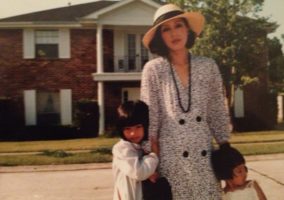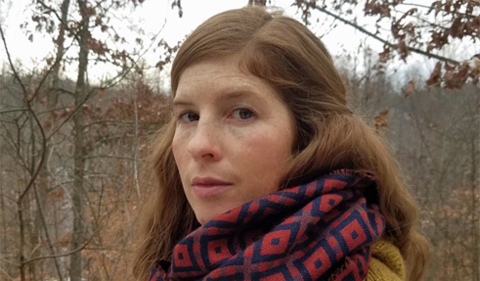by Kristin M. Distel
Elizabeth Tran, a doctoral student in creative writing at Ohio University, has won Prairie Schooner’s 2016 Summer Nonfiction Contest for her essay “Miss Saigon.”

Elizabeth Tran, doctoral student in creative writing
Tran’s essay discusses her mother’s experience of escaping the Vietnam War, as well as Tran’s personal and familial experience of surviving Hurricane Katrina. The goal in weaving together these two narratives, she explains, is to examine the ways in which trauma spans generations and arises from multiple life-changing experiences.
“The essay is also about my mom’s status as a beauty queen in Vietnam,” Tran explains. “Her giant silver trophy is on display in our house, and it was so mythologized in my mind. I often wondered how it got to the United States. The essay explores the trophy as object in my life and in my mother’s life, how we construct beauty and race, and how that changes depending on where you are. It’s about the transience of material objects.”
Tran examines the symbolism of the trophy alongside the devastating nature of Hurricane Katrina. “Shockingly, we didn’t lose anything in Katrina, and survivor’s guilt arises over and over again. There are so many kinds of trauma surrounding Katrina.”

Tran’s mother figures largely in her essay, ‘Miss Saigon’
Finding ‘the Remedy’ at OHIO
An earlier draft of the essay focused exclusively on Katrina, Tran explains, but she became aware that the essay required additional complexity in order to set it apart from other recently published work on Katrina.
“The first draft was just my experience with the hurricane, but there were so many Katrina essays already published, so I stepped away from it.” A nonfiction workshop with Eric LeMay, Associate Professor of English, prompted Tran to consider how she might revise the essay with additional, multi-generational narratives.
“In Eric’s class I came back to it, and I thought about Katrina-related trauma in other terms. There is a lineage of trauma in all families across multiple generations. The workshop helped me a lot. The remedy was to zoom out and think about more than just me. I had to realize that of course there were other people involved in my story.”

Tran’s essay examines family, place, and trauma that spans generations
Tran attributes her success in part to the design of OHIO’s English graduate curricula. Doctoral students are required to take workshops in genres other than the one in which they specialize, so Tran, a fiction writer, is also taking coursework in nonfiction writing and, through the Prairie Schooner contest, became an award-winning essayist.
“I definitely think that the format of the program encourages me to be creative and to write more. I would produce the same thing over and over if I weren’t in this program. It also helps to be exposed to my peers’ writing in workshop.”
Fostering Creativity in the Composition Classroom
Tran is currently teaching a course on the rhetoric of pop culture, and she notes that the English Department’s curricula and workshop format have helped her to become a more effective instructor. Because workshops and creative writing courses require intensive revision, Tran is learning how to encourage her students to rework and synthesize their ideas.
“Workshop prompts me to think critically, to articulate ideas to peers and students, and get students to participate,” Tran explains. “I think that that mental nimbleness allows me to write and teach more easily.”
Tran asks her students to consider the messages they receive from myriad forms of media and to think critically about the way they internalize those messages. “I’m teaching gender and race theory, as well as economists like Marx. I’m asking students apply theory to their daily lived realities, to think about what messages they’re receiving through rhetoric. I ask them to engage in creative ways with Instagram photos, reality shows, Facebook posts, music, and other forms of media. I’m giving them unconventional things to think about, like Beyoncé’s Lemonade album, and asking them to think about how these art objects were constructed.”
‘I wanted Kiese to read my essay’
The Prairie Schooner contest was judged by writer Kiese Laymon, whose work Tran has long admired. “I assign his essays to my students all the time,” Tran says. “We’ve both lived in Mississippi, and he does a great job of talking about his conflicted relationship with the South.”
Tran notes that she appreciates Laymon’s nuanced, delicate approach to complex issues. “Talking about that race can be divisive in the classroom, and his essays articulate that really well. I identify with him because of his emphasis on raced experience America. I’m Asian-American, and talking about my race feels difficult because I don’t suffer what Kiese suffers, but I do have a raced experience. In writing about the trauma my family has gone through, I realized that I wanted Kiese to read my essay. I submitted to the contest because he was the judge.”
As the winner of the Prairie Schooner Nonfiction Contest, Tran will receive a prize of $250, and her essay will appear in the Spring 2017 edition of Prairie Schooner. Her work is also forthcoming in the December issue of the Iron Horse Literary Review.



















Comments